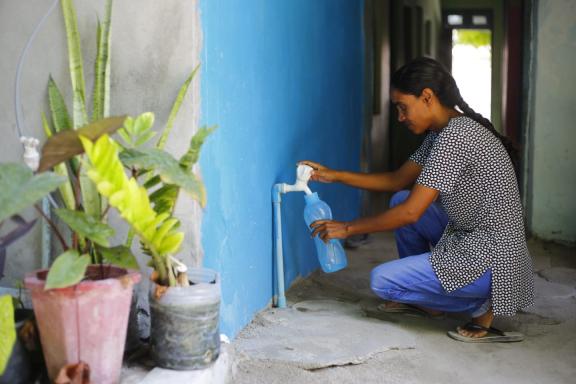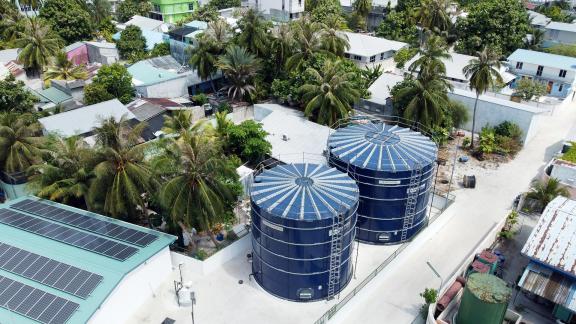From scarcity to sustainability: Maldives’ ambitious water security project
The Maldives, known as a luxury holiday destination with crystal blue water, is an idyllic island state in the Asia Pacific region. However, the Small Island Developing State (SIDS) is one of the most vulnerable nations to climate change and faces many unique challenges. Rising sea levels and increasingly erratic rainfall patterns are threatening the country's freshwater resources, putting the health and well-being of its people at risk.
The country is taking steps to restore water security on its most vulnerable outer islands. Drinking water shortages are a regular occurrence on the outer islands during the dry season, with significant impacts on people's health, food security, and productivity.
“To the Maldives, and to billions of people across the planet, the choice is obvious. We must act [on climate change] with utmost urgency.”

At current global warming rates, 80 per cent of the Maldives could be submerged by 2050 due to sea level rise. Photo: UNDP/Jin Ni
To tackle this issue, the Government of the Maldives launched a USD 28.2 million project in 2017 with the support of the Green Climate Fund (GCF) and the United Nations Development Programme (UNDP). The project aims to secure year-round, safe, reliable, and uninterrupted water supply to residents of the most vulnerable outer islands – around 105,000 people or one-third of the national population.

Integrated Water Resources Management (IWRM) systems are now directly benefiting island residents in the Maldives. Photo: UNDP/Maldives
The project also involves the Maldives Meteorological Service to enhance weather forecasting and enable improved harvesting of rainwater. New climate-resilient Integrated Water Resources Management systems (IWRM) are now operational on the four main islands of Nolhivaranfaru, Foakaidhoo, Maduvvari, and Dharavandhoo. The systems – which bring together rainwater, groundwater, and desalinated water – will serve as distribution hubs for seven northern islands during the dry season.
The construction of 25 Rainwater Harvesting Systems is complete, with new tanks designed to collect 150 tonnes of water in residential homes in addition to water collection at various public buildings. Unlike the previous community tanks, the new system uses ultrafiltration to treat and sterilise harvested rainwater. Four Intergrated Water Resource Management systems (desalination as well as rainwater harvesting) are also now operational.

Integrated Water Resources Management systems have now been handed over to Raa Maduvvari and Baa Dharavandhoo, Maldives. Photo: UNDP/Ashwa Faheem
The project’s model is cost-effective, combining expensive desalination technology and innovative water harvesting capabilities with slashed fuel import costs thanks to the switch to renewable energy. With access to safe drinking water, communities will benefit from reduced risk of waterborne disease, improved social security, and less outward migration from other islands, with flow on benefits for development, local tourism, and livelihoods. Ultimately, each and every citizen will have clean water on tap when they need it.
The project represents a turning point in water security in the Maldives, marking a transition from reactive emergency measures to long-term proactive solutions to tackle their water crisis. The Maldives government recognises the immense scale of its unique challenges and is focused on rapid climate action. Enhancing water security is a key focus under the small island state's climate goals to build more resilient islands. Through this project, they are taking a big step towards achieving their pledge to provide water networks to all inhabited islands by 2023.
With innovative solutions and a focus on long-term sustainability, annual water shortages will become a distant memory. This project serves as an inspiration for other countries facing similar challenges, prompting them to act and build a more resilient future for its people.
By Jin Hee Dieu (based on UNDP’s story)